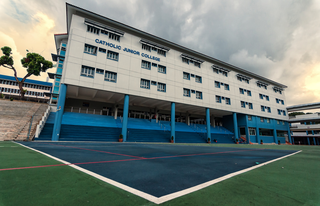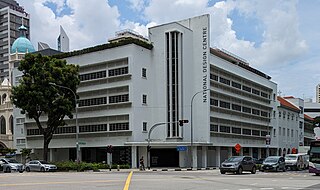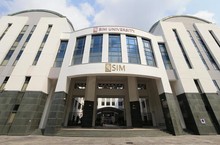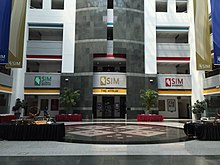
The Open University (OU) is a public research university and the largest university in the United Kingdom by number of students. The majority of the OU's undergraduate students are based in the United Kingdom and principally study off-campus; many of its courses can also be studied anywhere in the world. There are also a number of full-time postgraduate research students based on the 45 hectares university campus at Walton Hall, Milton Keynes, Buckinghamshire, where they use the staff facilities for research, as well as more than 1,000 members of academic and research staff and over 2,500 administrative, operational and support staff.

Education in Singapore is managed by the Ministry of Education (MOE). It controls the development and administration of state schools receiving taxpayers' funding, but also has an advisory and supervisory role in respect of private schools. For both private and state schools, there are variations in the extent of autonomy in their curriculum, scope of taxpayers' aid and funding, tuition burden on the students, and admission policy.

Temasek Junior College (TJC) is a government-run junior college temporarily located in Tampines. Its original location in Bedok South is currently undergoing reconstruction as part of the JC Rejuvenation Programme. It offers a six-year Integrated Programme alongside a two-year Singapore-Cambridge GCE Advanced Level curriculum.

Yishun Innova Junior College (YIJC) is one of the 14 junior colleges in Singapore, offering two-year pre-university programmes for students who graduate from secondary schools after their O-level examinations. The two-year A-Level programme prepares students for education in local or foreign universities.
The Special Assistance Plan is a programme in Singapore introduced in 1979 which caters to academically strong students who excel in both their mother tongue as well as English. It is available only in selected primary and secondary schools. In a SAP school, several subjects may be taught in the mother tongue, alongside other subjects that are taught in English. SAP schools currently cater only to those studying Mandarin as their mother tongue although theoretically, future SAP schools for other mother tongues are a possibility.
The Singapore Institute of Management (SIM) is a private tertiary education institution in Singapore. Founded on 28 November 1964 by the Economic Development Board (EDB), SIM is registered under the Committee for Private Education (CPE). SIM offers diploma, transnational undergraduate and postgraduate programmes, and executive education courses.

Catholic Junior College (CJC) is a junior college in Singapore, offering a two-year course for pre-university students leading to the Singapore-Cambridge GCE Advanced Level examination. Founded in 1975, Catholic Junior College was the third junior college to be established in Singapore.

The Singapore University of Social Sciences (SUSS) is a public autonomous university in Singapore. Established in 2017, SUSS focuses on applied degree programmes primarily in the social sciences. In 2017, SUSS received its inaugural class of 2,137 graduates.

The Ministry of Education is a ministry of the Government of Singapore responsible for the formulation and implementation of policies related to the education in Singapore.

Anderson Secondary School (AndSS) is a co-educational government autonomous school in Ang Mo Kio, Singapore offering education for Secondary 1 to Secondary 5. It became an autonomous school in 1994 and was one of the pioneer autonomous schools in Singapore.

CHIJ St. Nicholas Girls' School (SNGS) is a government-aided autonomous Catholic girls' school in Ang Mo Kio, Singapore. The school is one of 11 Convent of the Holy Infant Jesus (CHIJ) schools in Singapore and one of the designated Special Assistance Plan (SAP) schools. It offers a six-year primary education in its primary school section and a four-year secondary education in its secondary school section. Since 2013, it has partnered with Eunoia Junior College for a six-year Integrated Programme, which allows its secondary school students to skip the Singapore-Cambridge GCE Ordinary Level examinations and proceed to Eunoia for Years 5 and 6 and take the Singapore-Cambridge GCE Advanced Level examinations at the end of Year 6.

The Singapore Institute of Technology is a public autonomous university in Singapore. The university offers industry-focused, applied degree programmes; it confers its own degree programmes as well as specialised degree programmes with overseas universities.
Junior colleges (JC) are pre-university institutions in Singapore that offer two-year pre-university courses that leads to either the Singapore-Cambridge GCE Advanced Level or the International Baccalaureate Diploma. Admission to Junior college is based on the aggregate raw score of 20 points or less in O-Level "L1R5" in the examination. Lower aggregate is considered better, i e. 7 aggregate score is better than aggregate score 10. Bonus points are also deducted from this proscore to come up with the final score for the admission.

Tan Tai Yong is a Singaporean academic who is the current President of Singapore University of Social Sciences. He served as the President of Yale-NUS College from 2017 to 2022. He is also Chairman of the Management Board of the Institute of South Asian Studies, an autonomous university-level research institute in NUS. He was a former Nominated Member of Parliament and served from 2014 to 2015.
The establishment of Singapore Centre for Chinese Language was announced by Singapore Prime Minister Lee Hsien Loong on 6 September 2008, and was opened by then Minister Mentor Lee Kuan Yew on 17 November 2009. The Centre was established to position Singapore as a centre of excellence for the learning, teaching and educational research of the Chinese language in a bilingual context.
The Singapore University of Social Sciences School of Law is an autonomous law school of Singapore University of Social Sciences. It was established in 2017, as Singapore's third law school after the NUS Faculty of Law and the SMU School of Law. The school was established to address the shortage of practitioners in family and criminal law. In 2018, it was reported that of the 60 pioneer SUSS law students, seven have either dropped out or deferred their studies setting the attrition rate at 10%.
Leslie Chew Kwee HoePBM is a Singaporean legal academic and law professor. He is the founding Dean of the School of Law, Singapore University of Social Sciences, Singapore's third law school. He also regularly teaches in other institutions including the Singapore Institute of Arbitrators and the NUS Faculty of Law, as well as the Lee Kwan Yew School of Public Policy. Chew is the founding President of the Asia Pacific Institute of Experts.

The University of the Arts Singapore (UAS) is Singapore's first public-funded private university of the arts. It was formally announced in 2021, as an alliance between LASALLE College of the Arts (LASALLE) and Nanyang Academy of Fine Arts (NAFA). Under this arrangement, the two institutions operate as distinct entities yet allows students to access opportunities from both schools.

















